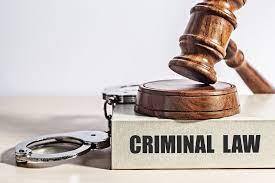Processing
"Criminal offense" refers to an action or inaction that violates the criminal laws of a country and is considered a crime.
- Criminal offenses are viewed as violations not only of an individual's private interests but also of the collective interests of society and its safety.
- They entail corresponding criminal liability and punishments, which may include imprisonment, fines, probation, or other sanctions, depending on the seriousness and nature of the committed crime.
- The process of addressing criminal offenses involves investigation by law enforcement agencies, a judicial process, and the issuance of a verdict.
- It's important to note that specific provisions of criminal law may vary in different countries, but the overarching goal is to ensure justice and hold individuals accountable for significant violations of the law.
Criminal offenses always attract the attention of society, as they pose a serious threat to safety, law and order, and integrity.
- Crimes such as murder, theft, robbery, and sexual assault not only evoke outrage but also violate the fundamental values and norms of civil society. In such situations, it is important to ensure effective investigation and a fair judicial process.
- One of the key elements of this process is the active role of attorneys in criminal cases, who guarantee legal protection and ensure justice.
- Criminal cases encompass a wide range of crimes that cause harm to individuals and society as a whole.
- Murder, being the most heinous criminal act, deprives people of their lives and carries the highest degree of unacceptability.
- Theft, robbery, and sexual assault violate personal safety, property interests, and the psychological well-being of the victims.
- Uncovering these crimes and holding the responsible parties accountable are important tasks for law enforcement agencies and the judiciary.
There are other types of criminal offenses, such as fraud, drug trafficking, corruption, economic crimes, cybercrimes, terrorism, and many more.
Each of these types of crimes has its own characteristics, requiring attorneys to have a deep understanding of the relevant legal framework and defense methods.
Crime lawyer act as leading advocates for the rights and interests of their clients.
- They ensure legal protection for individuals suspected or accused of committing crimes and guarantee them a fair judicial process.
- The work of attorneys involves gathering evidence, analyzing it, developing a defense strategy, and representing interests in court.
- They play an indispensable role in ensuring equality of the parties in criminal proceedings, helping clients understand their rights and duties, and assisting in negotiations for plea deals.
Attorneys in criminal cases employ various methods and techniques that allow them to effectively defend their clients. They use strategies based on laws, judicial practice, and their professional expertise.
Attorneys exert efforts to prepare for court proceedings, collect evidence, summon witnesses, and engage experts to support their arguments.
They also adeptly navigate court procedures, employ persuasive techniques during cross-examinations, and make arguments in the courtroom.
Ensuring justice and effective protection in criminal cases requires the active participation of competent attorneys. The disclosure and investigation of various types of criminal offenses are crucial stages in ensuring societal safety. Attorneys, through their professional expertise and legal knowledge, guarantee the protection of the rights and interests of their clients, contributing to the realization of justice in criminal cases. Their role lies in ensuring a transparent and fair judicial system where the right to defense for every individual is an integral component of the legal system.
































